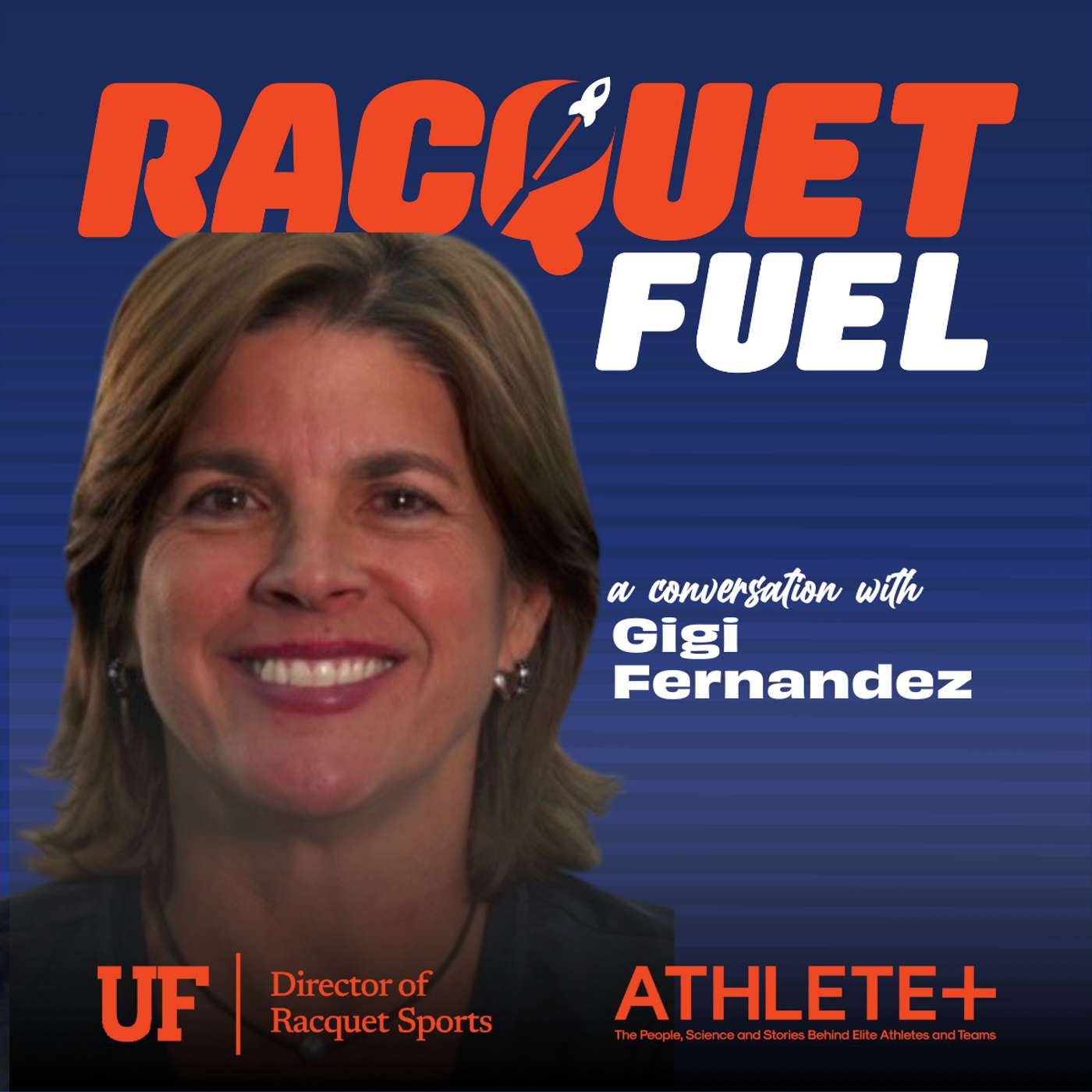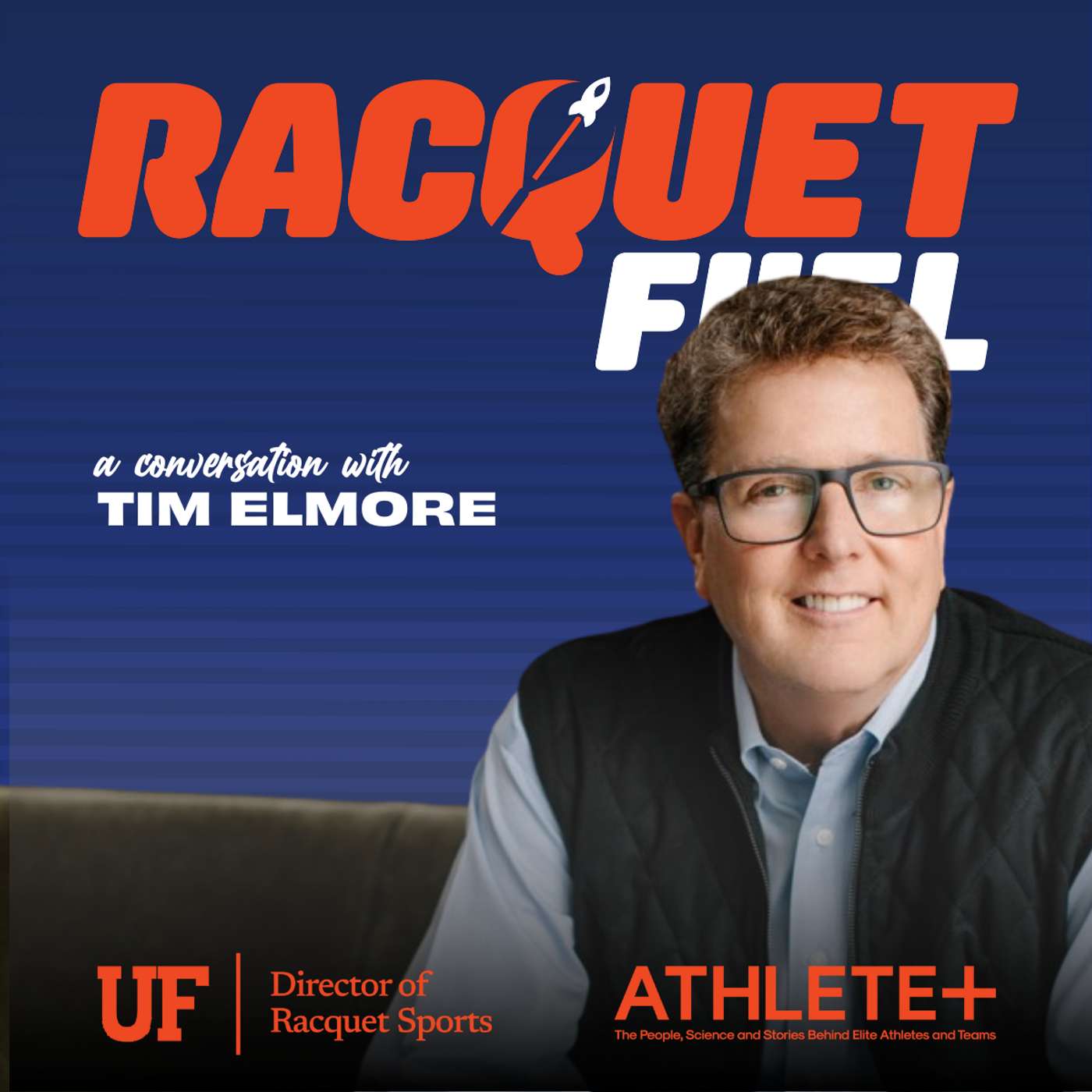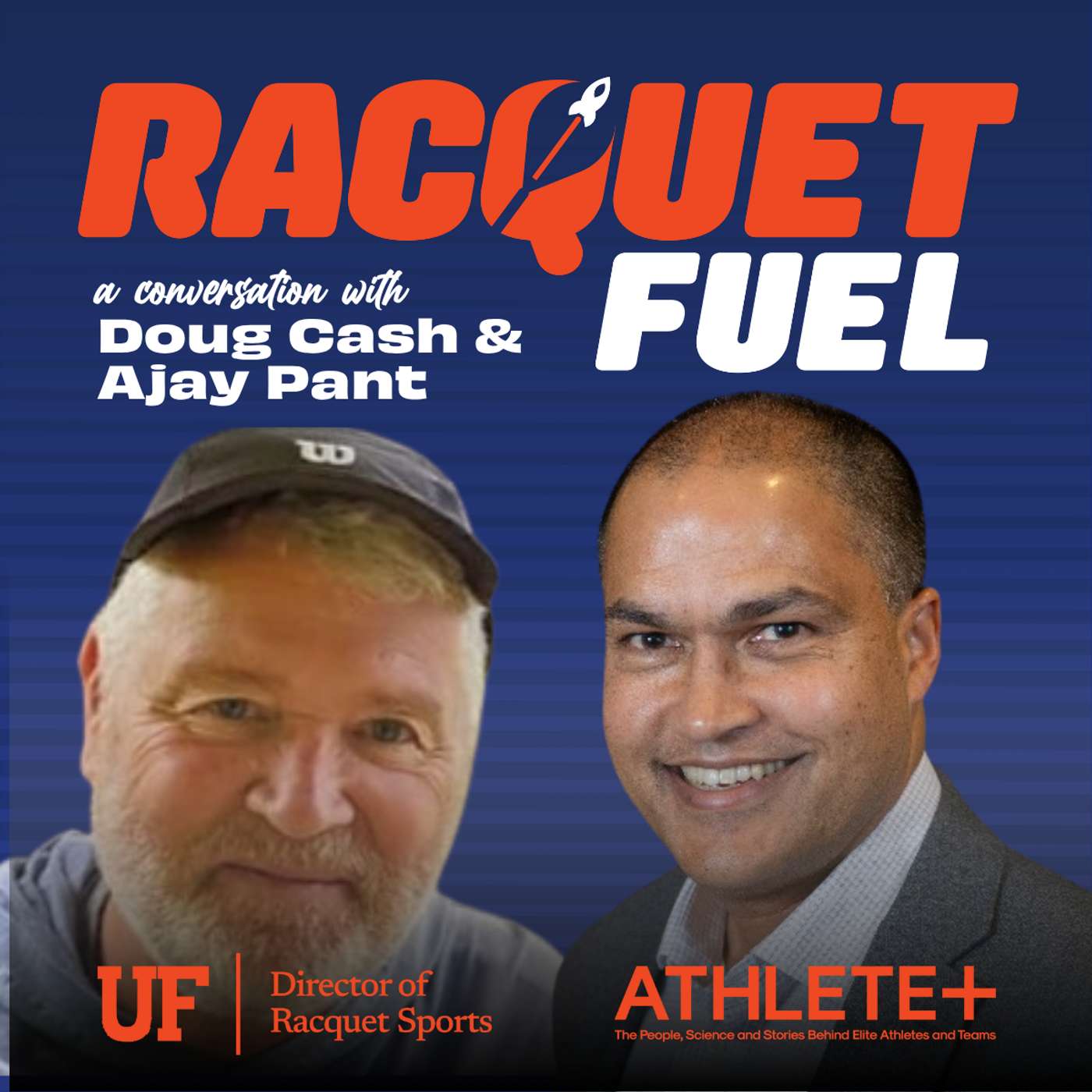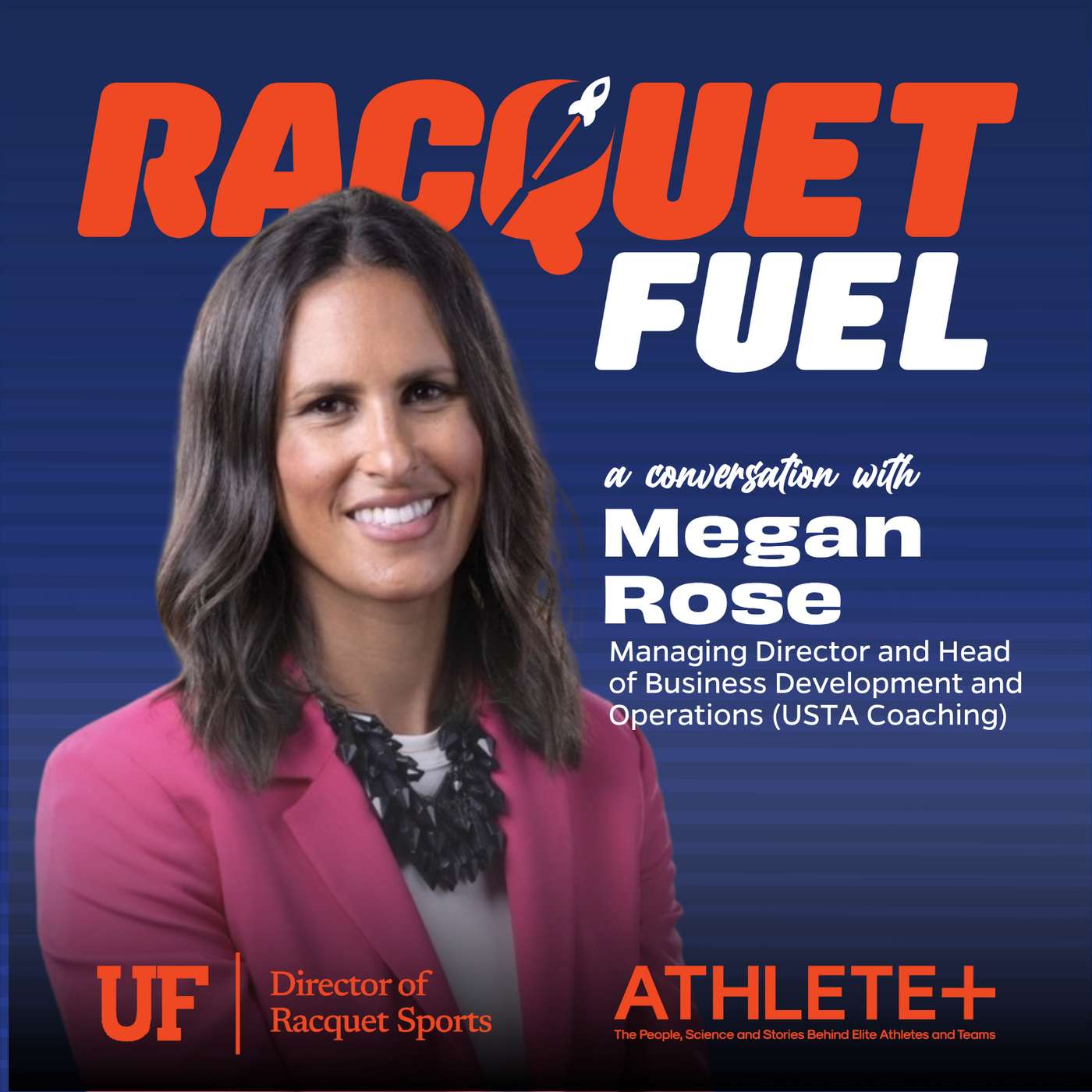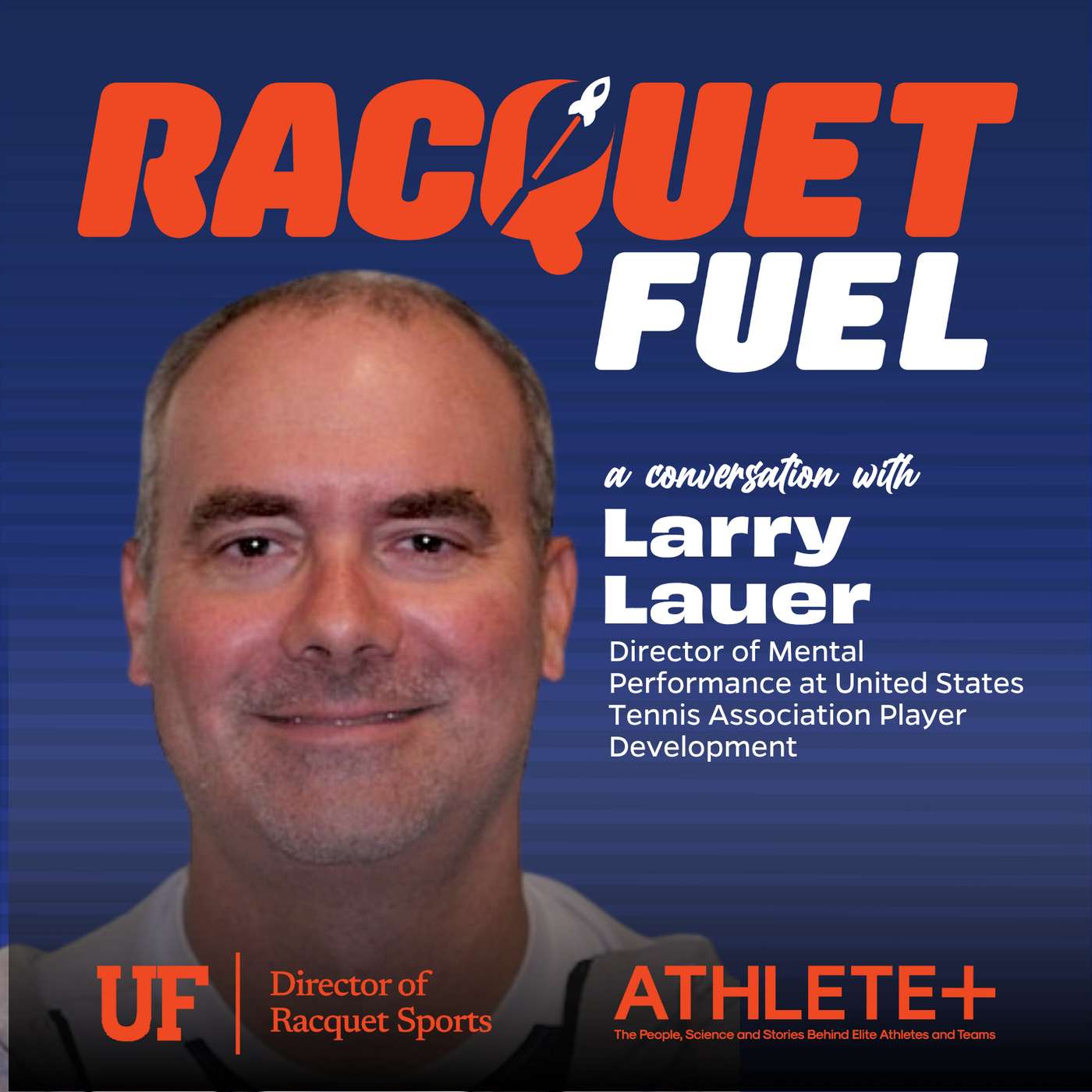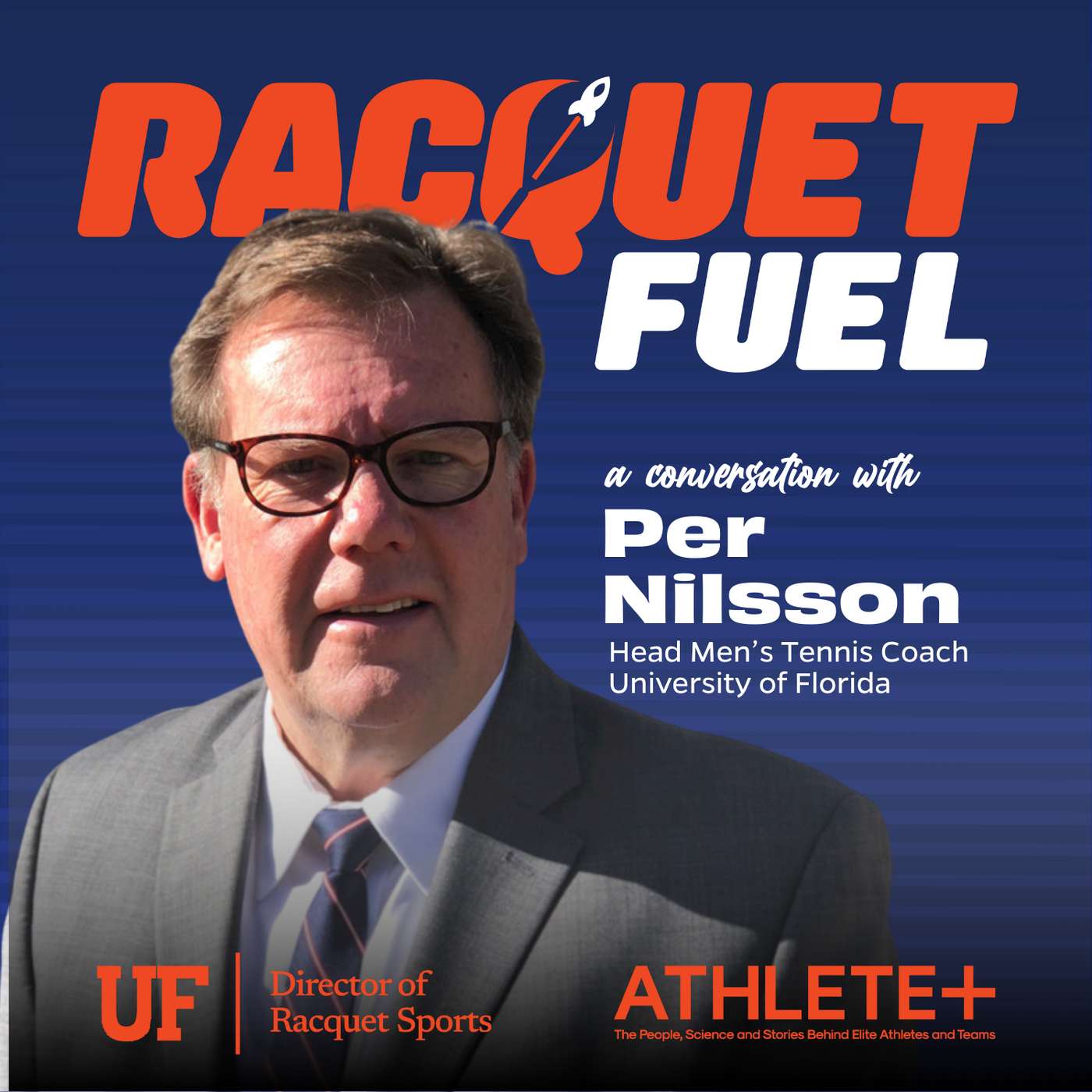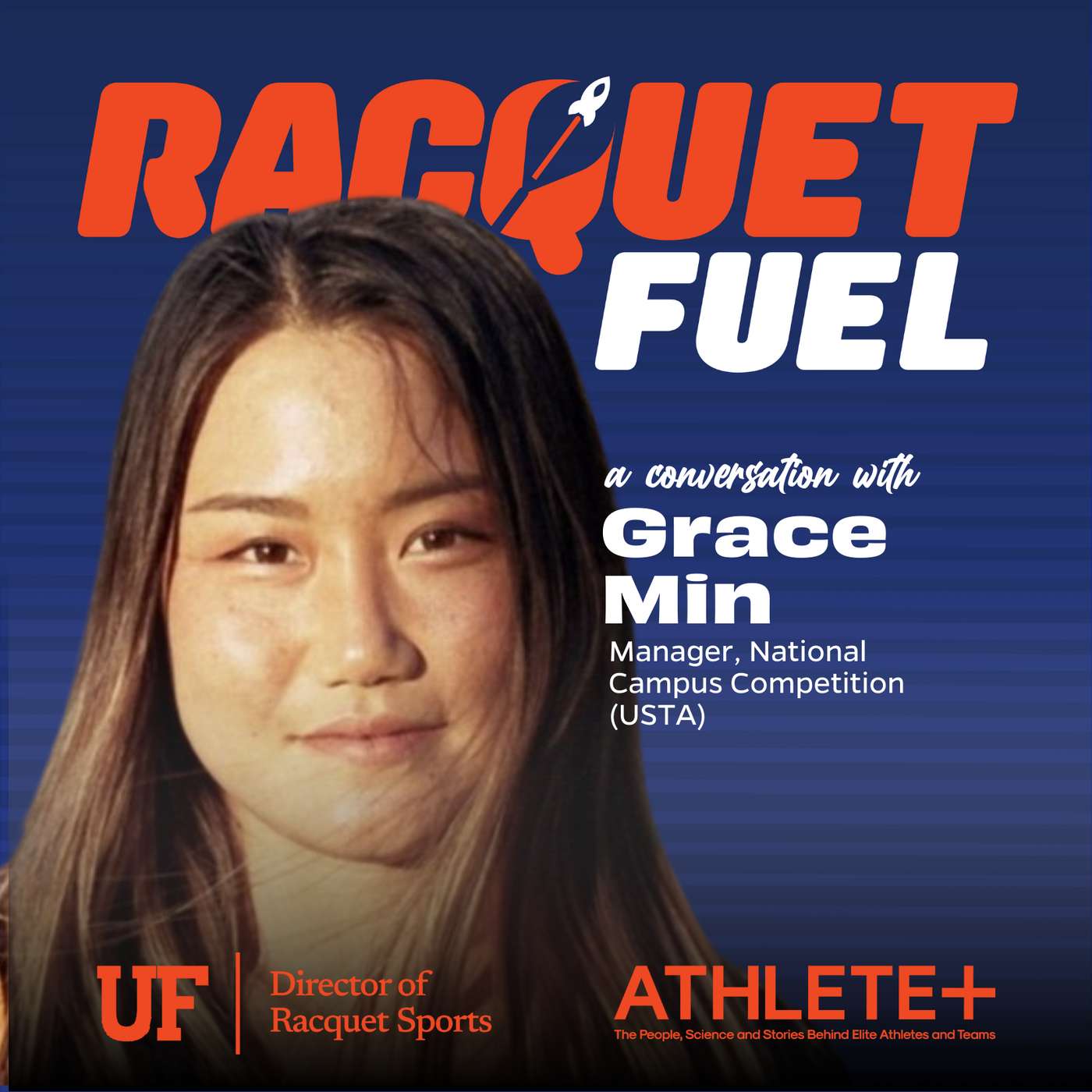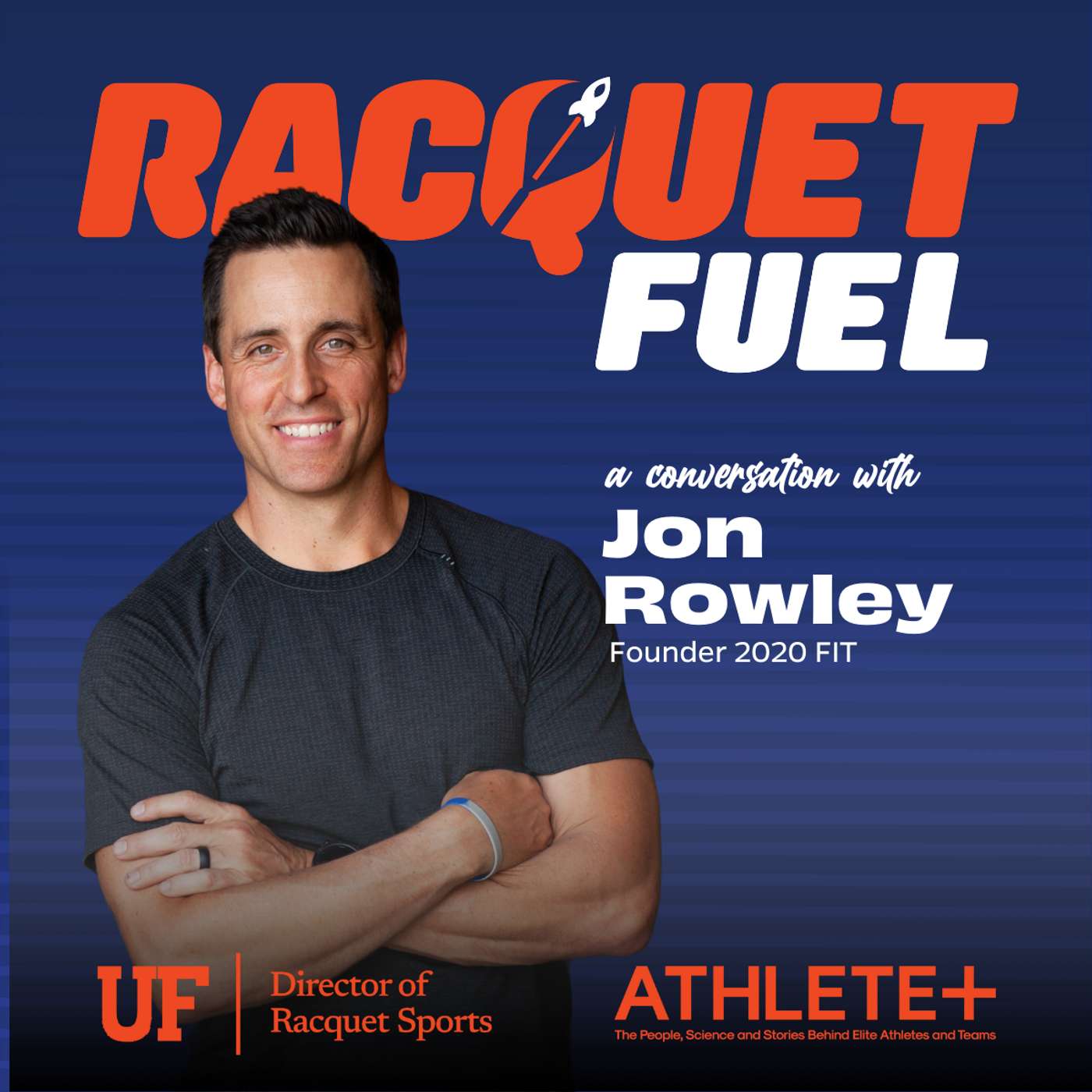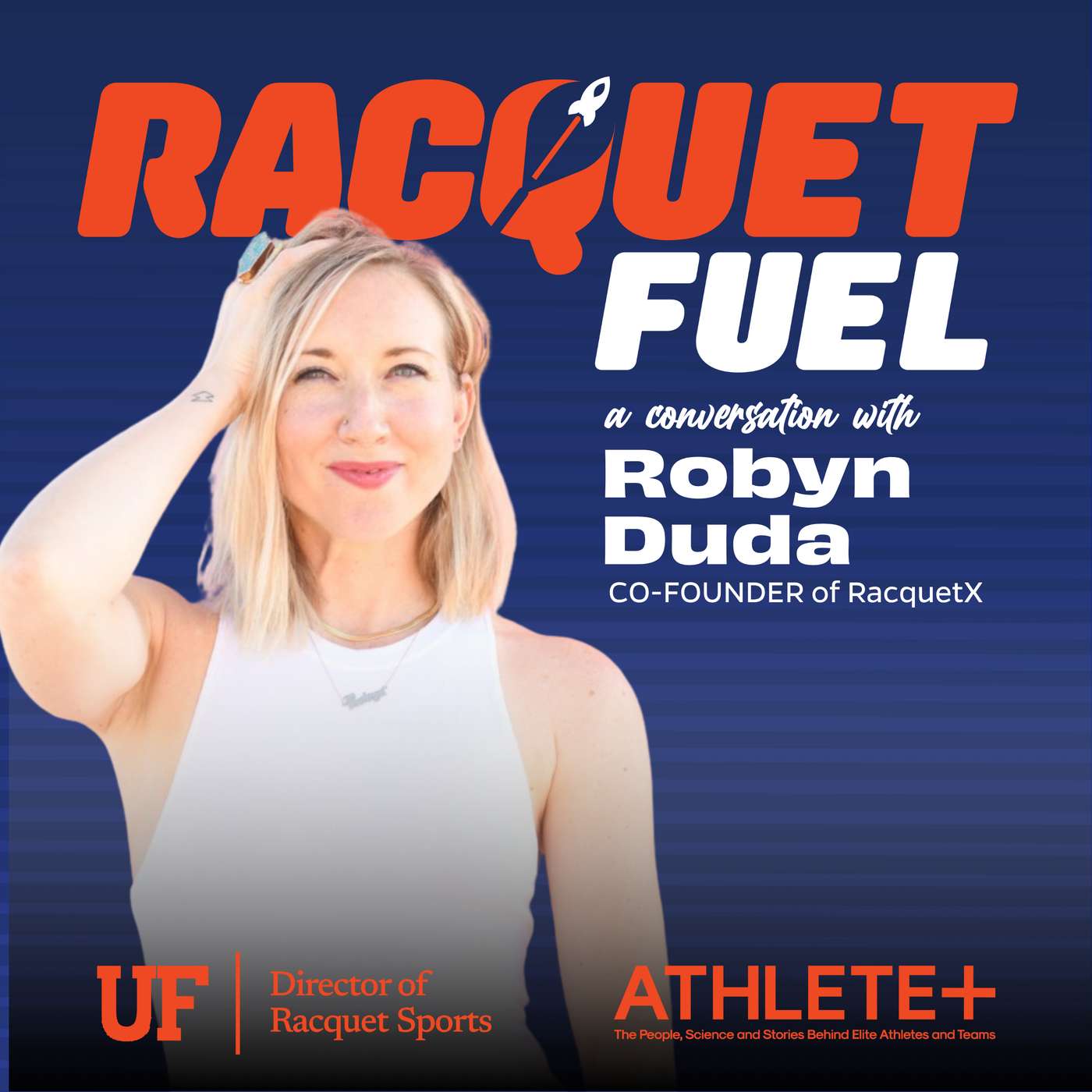Discover Racquet Fuel
Racquet Fuel

Racquet Fuel
Author: Athlete+
Subscribed: 2Played: 20Subscribe
Share
© 2023 UF Institute for Coaching Excellence
Description
Racquet Fuel provides insights into the best practices and innovations of racquets industry business leaders.
Co-hosts Kim Bastable, Director of Professional Tennis Management at the University of Florida, and Simon Gale, Senior Director Racquet Sports Development at the USTA National Campus, help racquets leaders in your ability to grow the game and to improve the experiences you offer to both your staff and players by talking to industry leaders, including USTA executives, authors and innovators. If you are on a career path in racquet sports or already a racquets business leader and you want to stay up to date on ideas and innovations in racquets industry business and leadership, this podcast is for you.
Presented by the Athlete+ Podcast Network at the University of Florida Institute for Coaching Excellence.
Co-hosts Kim Bastable, Director of Professional Tennis Management at the University of Florida, and Simon Gale, Senior Director Racquet Sports Development at the USTA National Campus, help racquets leaders in your ability to grow the game and to improve the experiences you offer to both your staff and players by talking to industry leaders, including USTA executives, authors and innovators. If you are on a career path in racquet sports or already a racquets business leader and you want to stay up to date on ideas and innovations in racquets industry business and leadership, this podcast is for you.
Presented by the Athlete+ Podcast Network at the University of Florida Institute for Coaching Excellence.
65 Episodes
Reverse
What happens when a Hall of Fame career ends and the real leadership work begins?In this episode of Racquet Fuel, hosts Kim Bastable and Simon Gale sit down with Gigi Fernandez, Hall of Fame tennis player, Olympic gold medalist, and founder of Tennis for Hope, to explore what leadership looks like after elite performance. Gigi shares her honest transition from individual excellence to collaborative leadership, including lessons learned running major programs like Chelsea Piers and launching a mission-driven foundation after personal loss. This conversation matters for anyone navigating the shift from being great at something to leading others with humility, purpose, and impact. What You’ll LearnWhy elite performance does not automatically translate to effective leadershipHow Tennis for Hope was born from personal adversity and community responseThe importance of surrounding yourself with people who are smarter than youHow ego can limit leadership growth and what it takes to dismantle itWhy networking is a long-term leadership skill, not a transactional oneHow tennis uniquely teaches resilience, failure, and emotional regulationWhat legacy-driven leadership looks like beyond wins and titlesHosts:Kim Bastable - UF Director of Racquet Sports EducationSimon Gale - USTA Leader & Facility ExecutiveGuest:Gigi Fernandez – Founder & President, Tennis for Hope; Tennis Hall of Famer & Olympic Gold MedalistLearn More & Get CertifiedRacquet Fuel is powered by the University of Florida’s Director of Racquet Sports Certificate Program, the industry’s leading education for current and aspiring racquets leaders. Explore our self-paced online courses — Personal Brand Management, Operations & Programming, and Leadership & Finance — and join the next generation of directors shaping the future of the game. 👉 Learn More & Enroll Here
What’s Really Going On with Gen Z in the Workplace?In this episode of Racquet Fuel, hosts Kim Bastable and Simon Gale sit down with leadership expert and author Tim Elmore to unpack the realities of Generation Z and how they’re reshaping the workforce. Tim breaks down insights from his new book, The Future Begins with Z, explaining what makes Gen Z tick — their mix of high agency, high anxiety, and a craving for authenticity. The conversation hits work-life balance, purpose-driven motivation, four-day workweeks, and how connection is vital.What You’ll Learn:Generation Z is rapidly becoming the core of the workforce.They bring strong agency but also elevated anxiety to the job.The Peter Pan paradox captures their tension between maturity and authority.Leaders must start with belief and understanding instead of frustration.Onboarding is a make-or-break moment for Gen Z belonging.Meaningful work and work-life balance drive their decisions.Gen Z is motivated by a blend of money and mission.Entrepreneurial, flexible environments keep them engaged.Connection > control when it comes to leading younger employees.Gen Z’s preferences will heavily shape the future of work.Hosts:Kim Bastable - UF Director of Racquet Sports EducationSimon Gale - USTA Leader & Facility ExecutiveGuest:Tim Elmore – Author of The Future Begins with Z, Leadership Expert, Founder of Growing LeadersLearn More & Get CertifiedRacquet Fuel is powered by the University of Florida’s Director of Racquet Sports Certificate Program, the industry’s leading education for current and aspiring racquets leaders. Explore our self-paced online courses — Personal Brand Management, Operations & Programming, and Leadership & Finance — and join the next generation of directors shaping the future of the game. 👉 Learn More & Enroll Here
What’s Driving the Explosion of Pickleball and Padel?In this episode of Racquet Fuel, hosts Kim Bastable and Simon Gale talk with industry pioneer David Johnson about the massive growth of pickleball and the rising momentum of padel in the United States. David shares his early journey co-founding Pickleball Central in 2006, what he’s learned watching the sport scale, and why participation curves are now shifting as the market matures.The conversation breaks down the real data behind growth trends, why multi-sport facilities are becoming the new norm, and what operators need to know before adding padel. They dig into staffing needs, leadership skills, membership models, and how hospitality ultimately determines whether a facility thrives.Hosts:Kim Bastable - UF Director of Racquet Sports EducationSimon Gale - USTA Leader & Facility ExecutiveGuest:David Johnson – Co-Founder of Pickleball Central, Pickleball ConsultantLearn More & Get CertifiedRacquet Fuel is powered by the University of Florida’s Director of Racquet Sports Certificate Program, the industry’s leading education for current and aspiring racquet leaders. Explore our self-paced online courses — Personal Brand Management, Operations & Programming, and Leadership & Finance — and join the next generation of directors shaping the future of the game. 👉 Learn More & Enroll Here
What standards are necessary to build a successful club?In this episode of Racquet Fuel, hosts Kim Bastable and Simon Gale talk with Consultants Doug Cash and Ajay Pant about the importance of standards in business, particularly in the context of tennis clubs. They explore how standards define a brand, the necessity of enforcing them, and the challenges of managing high performers who may resist compliance. The conversation also delves into the consequences of lacking standards, the process of building a new culture, and the role of leadership in maintaining quality control. Both Doug and Ajay emphasize the need for transparency, team involvement, and the evolution of standards over time to ensure a consistent and high-quality customer experience.What You’ll Learn:Standards are essential for setting expectations before hiring.The bigger and more corporate the club, the more likely they have written standards.Enforcement of standards is often lacking due to confrontation skills.Standards should evolve as the business improves.Involve the team in developing and agreeing on standards.High performers can be the hardest to manage when they resist standards.Quality control is crucial for maintaining product consistency.Transparency with standards helps in building trust with employees.The culture of a business is reflected in what happens when no one is watching.Hiring for cultural fit is vital for maintaining standards.Hosts:Kim Bastable - UF Director of Racquet Sports EducationSimon Gale - USTA Leader & Facility ExecutiveGuest:Ajay Pant - CEO & Owner of Karundy ConsultingDoug Cash - CEO & Owner of CashFlowTennis Learn More & Get CertifiedRacquet Fuel is powered by the University of Florida’s Director of Racquet Sports Certificate Program, the industry’s leading education for current and aspiring racquets leaders. Explore our self-paced online courses — Personal Brand Management, Operations & Programming, and Leadership & Finance — and join the next generation of directors shaping the future of the game. 👉 Learn More & Enroll Here
What does it take to launch a nationwide coaching initiative from the ground up, and make it thrive?In this episode of Racquet Fuel, hosts Kim Bastable and Simon Gale talk with Megan Rose, Managing Director of USTA Coaching, about how she’s leading one of the most ambitious projects in U.S. tennis history. From crafting the strategy to grow coaching pathways to navigating the gray areas of leadership, Megan shares lessons on adaptability, inclusion, and redefining success when there’s no playbook to follow.What You’ll Learn:How USTA Coaching fits into the “35 by 35” vision to reach 35 million players by 2035The three levers driving tennis growth—and why coaching is the most powerful oneWhat it really takes to build a national initiative from scratchHow to lead with bravery and make tough decisions without losing empathyThe biggest leadership lesson Megan learned from taking things too personallyWhy engagement—not numbers—is the real measure of successHow to attract and retain more diverse and balanced coaching teams across the U.S.Hosts:Kim Bastable - UF Director of Racquet Sports educationSimon Gale - USTA leader & facility executiveGuest:Megan Rose - Managing Director and Head of Business Development and Operations (USTA Coaching)Learn More & Get CertifiedRacquet Fuel is powered by the University of Florida’s Director of Racquet Sports Certificate Program, the industry’s leading education for current and aspiring racquets leaders. Explore our self-paced online courses—Personal Brand Management, Operations & Programming, and Leadership & Finance—and join the next generation of directors shaping the future of the game. 👉 Learn More & Enroll Here
What separates a good coach from a transformative leader? Mental performance expert Dr. Larry Lauer says it’s not talent or IQ—it’s reflection, self-awareness, and putting others first.In this episode of Racquet Fuel, hosts Kim Bastable and Simon Gale sit down with Dr. Larry Lauer, Director of Mental Performance at the USTA National Campus and co-host of the Compete Like a Champion podcast. Known for shaping the mental toughness and mindset of America’s top junior and pro athletes, Larry brings a fresh, research-backed lens to leadership in racquet sports. Together, they unpack the psychology of motivation, the power of mentorship, and how emotional intelligence impacts every level of coaching and management.What You’ll Learn:Why true leadership starts with asking, “Am I doing this for me—or for others?”How to develop daily reflection habits that keep you grounded and self-awareThe difference between intrinsic and extrinsic motivation—and why it matters for long-term successHow emotional intelligence shapes your ability to lead and connect with your teamThe most important skills directors can build to lead people, not just programsWhy mentorship accelerates leadership growth—and how to find and nurture great mentorsThe mindset shift every aspiring leader needs before stepping into a new roleResources & Mentions:Compete Like a Champion podcastDr. Dan GouldDr. Paul LubbersUSTA National CampusJohn WoodenHosts:Kim Bastable - UF Director of Racquet Sports educationSimon Gale - USTA leader & facility executiveGuest:Larry Lauer - Director of Mental Performance at United States Tennis Association Player DevelopmentLearn More & Get CertifiedRacquet Fuel is powered by the University of Florida’s Director of Racquet Sports Certificate Program, the industry’s leading education for current and aspiring racquets leaders. Explore our self-paced online courses—Personal Brand Management, Operations & Programming, and Leadership & Finance—and join the next generation of directors shaping the future of the game. 👉 Learn More & Enroll Here
If you “can’t find good pros,” this episode shows why that’s on us—and exactly how to build a repeatable Coach-in-Training (CIT) pipeline that grows talent and your business. Hosts Kim Bastable and Simon Gale make the case for actively inspiring the next generation of coaches—and walk through Simon’s proven CIT framework you can adapt at any club. Kim shares survey data showing only 17% of juniors had considered a racquets career and 60% hadn’t even heard of PTM programs, reinforcing why leaders must make the pathway visible and practical. Simon then breaks down how he formalized CIT—eligibility, responsibilities, and real benefits—so it became a staffed pipeline, not a summer favor. What You’ll LearnWhy “can’t find pros” is a leadership problem—and the mindset shift that fixes it.The one visibility move that instantly grows your coach pipeline.How Simon structures CIT levels so they scale without creating chaos.A simple compensation path that keeps teens engaged from season to season.The culture ritual that turns helpers into role models (and parents into fans).What to put on your website so talent finds you—not the other way around.The single calendar habit Kim uses to make coach development non-negotiable.--> Download the COACH IN TRAINING ResourceHosts:Kim Bastable - UF Director of Racquet Sports educationSimon Gale - USTA leader & facility executiveLearn More & Get CertifiedRacquet Fuel is powered by the University of Florida’s Director of Racquet Sports Certificate Program, the industry’s leading education for current and aspiring racquets leaders. Explore our self-paced online courses—Personal Brand Management, Operations & Programming, and Leadership & Finance—and join the next generation of directors shaping the future of the game. 👉 Learn More & Enroll Here
Racquet Fuel hosts Kim Bastable and Simon Gale sit down with Per Nilsson, head men’s tennis coach at the University of Florida, for a leadership-first conversation about college tennis. Per shares the two cornerstones of his program—deeply individualized player development and a deliberately small, connected roster—and how those choices shape culture, performance, and recruiting. He also unpacks navigating a mid-season transition at UF, why self-care makes you a better leader, and how building a community hub can future-proof the sport on campus. What You’ll LearnThe two cornerstones of Per’s program: maximize individual development while fostering a tight, small roster that pushes each other (think 7–8 players on a mission). How to individualize daily work so every athlete gets what they need (e.g., surplus-one patterns for one player, mental skills for another) instead of rolling out the same plan for all. Leading through a mid-year coaching transition: keep people whole in the moment, make the hard calls later, and align around a new vision. You’re never “ready”—learn faster: over-communicate up/down, ask questions relentlessly, and shape authority with clarity. Why self-care is leadership: turn the phone off, protect family time, then show up better for your team. Future-proofing college tennis: build a campus community hub (donors, fans, shared value) so tennis becomes “untouchable” when cuts are considered. Steal like a coach: Per openly “copies” what works, adapts it to his context, and keeps what produces results. Guest:Per Nilsson - Head Men’s Tennis Coach, University of Florida (Gators Men’s Tennis).Hosts:Kim Bastable - UF Director of Racquet Sports education Simon Gale - USTA leader & facility executiveLearn More & Get CertifiedRacquet Fuel is powered by the University of Florida’s Director of Racquet Sports Certificate Program, the industry’s leading education for current and aspiring racquets leaders. Explore our self-paced online courses—Personal Brand Management, Operations & Programming, and Leadership & Finance—and join the next generation of directors shaping the future of the game.👉 Learn More & Enroll Here
What happens when a former top-100 player takes her competitive mindset and applies it to managing over 350 event days at the USTA National Campus? In this episode of Racquet Fuel, hosts Kim Bastable and Simon Gale sit down with Grace Min—a former WTA top-100 player who retired in 2024 and quickly transitioned into her role as Event Manager at the USTA National Campus. Grace shares how she’s adapted her player mindset into leadership, the surprising similarities between competing on tour and managing large-scale events, and what every director can learn about communication, adaptability, and feedback. Her story is both inspiring and practical for anyone managing programs, tournaments, or teams in racquet sports.What You’ll LearnWhy adaptability—learned on tour—may be the most valuable skill in event managementHow to balance fundamentals (scheduling, officiating) with “elevators” that make events memorableThe role of feedback loops and after-action reports in improving events year over yearThe challenge of moving from giving feedback as a player to receiving it as a managerWhy effective communication is essential when leading high-performance teamsHow mentorship and process-oriented thinking can help directors avoid burnoutGrace’s simple mantra for events (borrowed from her coach): Win the last pointEpisode HighlightsGrace’s decision to pivot from playing to management after injury and why events, not coaching, felt like the right fitThe striking similarities between training for tournaments and planning eventsWhy the “pressure is a privilege” at the National Campus and how her team manages expectationsThe unexpected joy Grace found in team camaraderie after years in an individual sportConnectGrace Min – LinkedInHosts:Kim Bastable – LinkedInSimon Gale – LinkedInLearn More & Get CertifiedRacquet Fuel is powered by the University of Florida’s Director of Racquet Sports Certificate Program, the industry’s leading education for current and aspiring racquets leaders. Explore our self-paced online courses—Personal Brand Management, Operations & Programming, and Leadership & Finance—and join the next generation of directors shaping the future of the game.👉 Learn More & Enroll Here
From four clients in a garage to a 15,000-sq-ft hub with 500+ members, Jon Rowley shares the playbook racquet clubs can use to grow with standards, systems, and heart.In this Racquet Fuel episode, hosts Kim Bastable and Simon Gale sit down with Jon Rowley, founder and “Chief Exercise Officer” of a thriving Kansas City fitness community. Jon’s journey (from moonlighting trainer in Chicago to leading a 500-member operation) mirrors the realities club leaders face: hiring for culture, avoiding burnout, and turning standards into belonging. If you’re building a modern racquets department or club business, Jon’s blend of operational discipline and people-first leadership is a masterclass in sustainable growth.What You’ll LearnCulture you can feel: The simple values (“Work hard. Be kind.”) and everyday standards (no hats/shirts-on, no profanity) that create psychological safety and professionalism.Hiring that sticks: Why having candidates take a class reveals fit under light pressure, and how hiring from within preserves culture.Upskilling smartly: A practical education model—baseline certs plus ~$2K/year per coach for horizontal learning (e.g., women’s health)—that deepens service without bloating budgets.Leader on the floor: How staying in the trenches keeps your ear to members and your team, while still steering long-term vision.Delegation that works: Moving from “I’ll just do it” to training others—accepting the short-term time cost to win back hours forever.Business model guardrails: How operations, bookends, and clear systems prevent burnout and make the role attractive as a real career.Community > classes: Turning daily workouts and lessons into life-improving habits that keep people coming back.ConnectGuest – Jon Rowley • Website: https://www.2020fit.com/ • LinkedIn: https://www.linkedin.com/in/jon-rowley-23688020/ • Instagram: https://www.instagram.com/2020.fit/HostsKim Bastable – https://www.linkedin.com/in/kim-bastable-uf/ Simon Gale – https://www.linkedin.com/in/simongaletennis/Learn More & Get Certified (UF DORS)Level up your racquets leadership with the University of Florida Director of Racquet Sports Certificate Program—three self-paced online courses designed with today’s club realities in mind:Personal Brand Management (open now - use code RF25 for $25 off for a limited time)Course 1: Operations & Programming (open now - use code RF100 for $100 off for a limited time)Course 2: Leadership & Finance (coming soon)Learn more and START TODAY!
What does it really take to turn a life on the court into a sustainable career in racquet sports?In this episode of Racquet Fuel, longtime tennis pro, club owner, and author Greg Moran joins hosts Kim Bastable and Simon Gale to unpack 40 years of experience in a single facility, and the powerful lessons that came with it.From starting as a ball boy to building one of Connecticut’s most successful clubs, Greg shares how intentional leadership, early financial planning, and a commitment to professionalism shaped his long career. He also opens up about his own mistakes, including spreading himself too thin and failing to delegate, and offers clear advice for anyone wanting to stay in this profession for the long haul.If you've ever wondered how to create a fulfilling, sustainable life in racquet sports (or how to mentor others to do the same) this conversation is a must-listen.By the end of this episode, you’ll learn:How to lead yourself before leading a teamWhy many teaching pros hit a wall—and how to avoid itThe critical difference between coaching and being a racquet sports professionalHow to build confidence in junior pros through gradual leadership experiencesWhat Greg would do differently if he could start overWhy thinking long-term is key to both financial and professional growthThe unseen cost of ignoring physical wear-and-tear in racquet sports careersHow to inspire your team through example, not just instructionResources & MentionsBooks by Greg MoranJorge Capestany's TennisDrills.tv: https://www.tennisdrills.tvReferenced quote from Joe Curdo: “If you don’t have a sense of humor in the tennis business, you’re never going to last.”Learn More & Get CertifiedLooking to become a more confident, competent, and clear business leader in racquet sports? Start your journey TODAY with online courses on racquet sports leadership:Personal Brand Management for the Racquets Industry - START TODAY 🎁 Use code RF25 for $25 off for a limited timeCourse 1: Facilities, Operations, Marketing & More in the Era of Multiple Racquet Sports - START TODAY 🎁 Use code RF100 for $100 off for a limited timeCourse 2: Leadership, management & finance For the Racquets Leader - COMING SOON
What if your greatest coaching lesson came off the court?In this episode of Racquet Fuel, Kim Bastable and Simon Gale sit down with Emma Doyle: tennis coach, keynote speaker, and expert in emotional intelligence, to explore what it really takes to coach with impact, whether you're leading athletes, employees, or entire teams.Emma shares her remarkable journey from teenage coach in Australia to global thought leader and business coach. She opens up about the pivotal moments that shaped her career including burnout, reinvention, and finding her voice during COVID... and the frameworks she now uses to train leaders in Fortune 500 boardrooms and racquet clubs alike.With humor, heart, and contagious energy, Emma shows us how coaching is a title AND a way of leading that centers on empathy, curiosity, and action. Whether you’re a club director, department manager, or aspiring coach, her insights will challenge and inspire you to listen deeper, lead better, and unlock the potential in those around you.By the end of this episode, you'll learn: - How coaching cultures can elevate performance and reduce disengagement - Why the best leaders ask better questions instead of giving all the answers - How to empower others through curiosity, not control - The mindset shift needed to lead people, not just programs - Why the phrase “next time” might be your most powerful coaching toolWhether you're building a business, managing a team, or coaching on court, this conversation will equip you with practical tools and perspective for becoming the kind of leader people want to follow.🔗 Connect with Emma Doyle on LinkedIn or at CoachEM.cc🔗 Watch her TEDx talk: "Unleashing Female Potential"🔗 Explore her podcast: The Coaching PodcastLooking to become a more confident, competent, and clear business leader with a lifelong career in the racquets industry? Become a Certified Director of Racquet Sports. Visit our website to learn more!
What happens when you bring together startup ambition, big-event expertise, and a deep commitment to human connection? You get RacquetX: an experience designed to connect every corner of the racquet sports industry.In this episode of Racquet Fuel, Kim Bastable and Simon Gale talk with Robyn Duda, the founder and creative mind behind RacquetX. With a background in designing global corporate events, Robyn saw a gap in the racquet sports space: no centralized experience for connection, collaboration, and future-focused growth. So, she built it.This conversation unpacks the real challenges and vision behind building an industry-first event from the ground up—complete with indoor courts, live programming, and an unshakable focus on belonging. Robyn shares what it’s like to lead with vulnerability, navigate the unknown, and reshape how racquet sports professionals come together to move the industry forward.By the end of this episode, you’ll learn:Why the racquet sports industry needed something like RacquetX—and what makes it differentThe real challenges of launching a startup within a traditional industryWhat goes into creating meaningful experiences that connect diverse sectorsHow leadership, risk, and emotional honesty shape powerful innovationWhat clubs, coaches, and brands are craving when it comes to the future of communityWhether you're a club director, brand leader, coach, or entrepreneur, this episode will expand how you think about progress in racquet sports—and how bold ideas turn into movement.Listen to hear how one person’s clarity of vision—and willingness to do the hard work—is reshaping how the racquet sports world shows up and connects.Connect with Robyn Duda at TheRacquetX.com Connect with Kim Bastable on LinkedInConnect with Simon Gale on LinkedInLooking to become a more confident, competent, and clear business leader with a lifelong career in the racquets industry? Visit our website to learn more!
What does it actually take to build a thriving racquet sports facility in today’s fast-moving market? And what’s just hype?In this episode of Racquet Fuel, hosts Kim Bastable and Simon Gale are joined by Eric Loftus, an expert court builder and board member of the American Sports Builders Association. With more than 50 years in the tennis and racquet construction industry, Eric shares what he’s seeing on the ground—and where the court construction world is headed next.They explore the real economics behind pickleball and padel, the growing pains of a booming market, and why many clubs are struggling to master the land, logistics, and legislation that come with trying to “add a few courts.” Whether you're a facility leader, investor, or simply trying to keep up with trends, this episode offers clarity in a rapidly evolving landscape.By the end of this episode, you'll learn:✅ Why post-COVID demand transformed racquet sports, and what that means for club infrastructure✅ The real costs, challenges, and misconceptions around building courts for padel and pickleball✅ Why “build it and they will come” doesn’t work without community and quality instruction✅ How clubs can avoid the biggest mistakes in court planning, compliance, and construction ✅ What the rise of padel in Europe tells us about the future of U.S. racquet sports facilitiesWhether you're managing a country club, building from scratch, or looking to future-proof your programs, this episode breaks down what’s really happening in racquet sports construction, and what comes next.Connect with Eric Loftus on LinkedIn and at Northeast Padel Connect with Kim Bastable on LinkedIn Connect with Simon Gale on LinkedInLooking to become a more confident, competent, and clear business leader with a lifelong career in the racquets industry? Visit our website to learn more!
If we have a shortage of pros and an abundance of positions in the racquets industry, why must you make your resume stand out? The reason is because the employer is still seeking the best person for the position. In this episode of Racquet Fuel, Kim Bastable and Simon Gale give their opinion on how you can make the best first impression - one that will almost guarantee getting you to the top of the interview pile. They share tips and insights on highlighting your achievements, how to effectively communication your qualifications to potential employers, how to discuss compensation (or not), and the dos and donts for recorded video interviews.By the end of this episode you'll know:- How to make a good first impression before an interview- Ways to make cover letters stand out- The difference in achievements and tasks in your job history- How long a resume should be- Professional ways to address compensation- Dos and donts for video submissions... and the secret to get to the TOP of Simon Gale's interview pile.Looking to become a more confident, competent, and clear business leader with a lifelong career in the racquet sports industry? Become a Certified Director of Racquet Sports. Visit our website to learn more!
What happens when a key person on your team tells you they’re leaving—and you're the one who has to figure out what comes next?In this episode of the Racquet Fuel Podcast, Kim Bastable and Simon Gale explore the emotional and operational challenges that come with losing top talent. Simon shares his real-time experience managing the departure of a trusted team leader and walks through the decisions, reflections, and strategies he's using to guide his team through a critical transition.From the first gut reaction to the long game of hiring right, this episode is a behind-the-scenes look at how strong leaders respond to sudden change—with clarity, care, and a willingness to reimagine what the team needs next.By the end of this episode, you’ll learn:✅ How to navigate the emotional weight of losing key personnel✅ Why clear communication with staff is essential during transitions✅ The importance of re-evaluating job roles instead of copy-pasting old ones✅ How external perspectives and internal feedback shape a better hiring process✅ Why rushing the hire can hurt more than waiting✅ How delegation, collaboration, and culture protect teams during leadership gaps✅ How change becomes a chance to reflect, grow, and build something betterWhether you’re facing this challenge now or preparing for it in the future, this episode is a practical and honest look at leadership in action.🎧 Listen now and learn how to manage change without losing momentum - AND for a $40 off code for the NEW Personal Branding for Racquet Sports Professionals Course!Looking to become a more confident, competent, and clear business leader with a lifelong career in the industry? Become a Certified Director of Racquet Sports. Visit our website to learn more!
What does it take to thrive as a young professional in the racquet sports industry, and how can today’s leaders support that journey?In this episode of Racquet Fuel, hosts Kim Bastable and Simon Gale sit down with Kyle Pipkin, a recent graduate of Hope College’s Racquet Sports Management program, to explore the early-career experiences shaping the future of tennis leadership. From internships and on-court grind to conferences and career crossroads, Kyle offers a refreshingly honest perspective on what young coaches face as they enter the industry... and what they need to stay in it.He shares his personal path from a public tennis center in Texas to becoming assistant director of the RSM program at Hope College, and challenges the industry to look beyond hourly tasks and toward long-term development, mentorship, and meaning.By the end of this episode, you’ll learn:✅ Why the right mentor (or the lack of one) can launch or derail a young coach’s entire career trajectory✅ The real tension between generations in tennis... and what no one’s saying out loud ✅ Why showing up, shaking hands, and being seen matters more to young pros than another bullet-pointed presentation✅ How to turn “just the new guy” into someone who feels like they belong and have a future✅ The one thing that keeps Kyle up at night as he steps into leadership: what if they leave because of me?Whether you’re a seasoned director, a young pro just starting out, or someone looking to strengthen team culture, this episode is a must-listen. Kyle’s insights challenge us to be more curious, more intentional, and more invested in developing the next generation of leaders in racquet sports.Connect with KYLE PIPKIN on LinkedInHOPE College Professional Racquet Sports ManagementLooking to become a more confident, competent, and clear business leader with a lifelong career in the industry? Become a Certified Director of Racquet Sports. Visit our website to learn more!
What does it take to land your first Director of Racquet Sports job - and lead with confidence once you do?In this episode of Racquet Fuel, hosts Kim Bastable and Simon Gale sit down with Michael Pereira, who shares his honest, inspiring journey from teaching pro to facility leader.Michael walks us through the hard truths of chasing your first director role - from 23 job rejections to launching his own business managing a city tennis center. Along the way, he shares how earning his Director of Racquet Sports Certificate and Master’s in Sport Management from the University of Florida prepared him not only to get the job, but to succeed in it.Now nearly a year into leading Querbes Tennis Center in Shreveport, LA, Michael reflects on the challenges of managing people, building systems, and learning that leadership isn’t about getting off the court - it’s about stepping up in new ways.By the end of this episode, you’ll learn:✅ Why getting hired as a first-time director is harder - and more rewarding - than it looks✅ What it means to lead a team, not just run a program✅ How Michael used mentorship, networking, and education to break into leadership✅ Why your resume gets you in the door- but relationships close the deal✅ The key mindset shifts from coaching players to managing staff✅ Why directors need systems, not just vision - and how Michael built his from the ground up✅ What leadership really looks like when you’re working 60–70 hours a week and still excited to show upWhether you're an aspiring director, a hiring manager, or someone in the middle of the transition from court to office, this episode is a must-listen. Listen now and hear how one coach turned “no” into “now,” and is building something he’s proud of: one system, one hire, and one clay court at a time.Connect with Michael Pereira on LinkedInConnect with Kim Bastable on LinkedInConnect with Simon Gale on LinkedInLooking to become a more confident, competent, and clear business leader with a lifelong career in the industry? Become a Certified Director of Racquet Sports. Visit our website to learn more!
What does it take to leave a successful career in club leadership and launch into consulting? In this episode of Racquet Fuel, hosts Kim Bastable and Simon Gale sit down with longtime industry leader Ajay Pant to explore his recent transition into the world of racquet sports consulting.Ajay shares what prompted the shift, how his consulting practice works, and what clubs should know before bringing in a consultant. From system gaps and professional development needs to the future of industry leadership, Ajay offers an honest and practical look at what it takes to support long-term success in racquet sports.By the end of this episode, you'll learn:Why leaving a high-level leadership role to become a consultant provided perspective on what clubs truly need to growWhat consultants actually do behind the scenesThe hidden gaps holding clubs back and how addressing them can unlock major growthThe most overlooked (and most powerful) tools in leadership todayHow consulting compensation is evolvingWhy leadership is more than a title... it’s a sacred responsibilityWhether you’re a club owner, director, or aspiring leader, this episode will give you a behind-the-scenes look at the consulting side of the industry - and how to create stronger, more sustainable businesses.Connect with Ajay Pant on LinkedIn and for consulting opportunities on his website!Looking to become a more confident, competent, and clear business leader with a lifelong career in the industry? Become a Certified Director of Racquet Sports. Visit our website to learn more!
How does someone go from directing films in Hollywood to directing racquet sports at a country club? In this episode of Racquet Fuel, hosts Kim Bastable and Simon Gale sit down with Bryan Fox, Director of Racquet Sports at Lakeshore Country Club, to explore his fascinating journey from the entertainment industry to the world of tennis.Bryan shares what pulled him away from Hollywood and into racquet sports, how his background in storytelling and performance fuels his creativity as a director, and why human connection is at the core of everything he does. With insights on career reinvention, creative programming, and staying relevant in a rapidly evolving industry, this episode is an inspiring listen for anyone building a meaningful career in racquet sports.By the end of this episode, you'll learn:✅ Why Bryan left a successful Hollywood career to pursue deeper fulfillment in tennis✅ How creativity and storytelling can enhance member engagement and programming✅ Why human connection (not technique) is the foundation of great coaching and leadership✅ How to embrace innovation with new sports like Padel and Pickleball✅ What it means to build a long-term, sustainable career in racquet sports✅ Why taking risks and learning from failure is essential for personal and professional growth✅ The importance of building community on your team, with your players, and in your club✅ How creative events like “Pops & Paddle” and junior “World Tour” camps create lasting impactWhether you're a coach, aspiring director, or longtime leader, this episode will remind you that your background is an asset, and that fulfillment often comes from going back to what you loved in the first place.Listen now to hear how Bryan Fox brought a Hollywood mindset to racquet sports... and why he’s never looked back.Looking to become a more confident, competent, and clear business leader with a lifelong career in the industry? Become a Certified Director of Racquet Sports. Visit our website to learn more!


